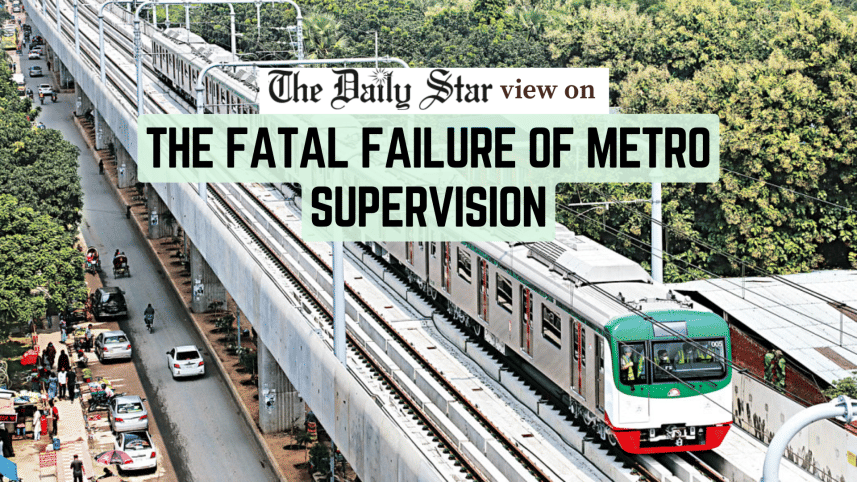Metro tragedy exposes fatal supervision failure

We are deeply alarmed by the death of a pedestrian struck by a falling bearing pad from Dhaka's metro rail. But behind this tragic death lies a baffling negligence of supervision by the authorities responsible for public safety. Public infrastructure is more than steel and concrete—it represents a covenant of trust, a promise that the systems designed to improve daily life are, above all, safe.
That covenant was shattered on a street in Dhaka's Farmgate area on Sunday. The falling component killed a 35-year-old man named Abul Kalam Azad. Just a year ago, an identical component fell from a pillar a short distance away. That no one was killed then was a matter of luck. The repetition of such an outrageous failure suggests that the initial incident was treated as a glitch to be managed, rather than a serious warning that should have triggered a comprehensive safety review.
The immediate aftermath of Sunday's incident has followed a predictable script. The authorities suspended metro services, causing widespread disruption. A committee has been formed to investigate. Compensation has been promised to the victim's family. These are administrative reflexes, not solutions. They do little to confront the deeper crisis—lax supervision and weak accountability. The explanations offered so far by the authorities are alarming in their vagueness. The managing director of Dhaka Mass Transit Company Ltd (DMTCL) speculated about "jerking of the line," a "construction issue," or a "design flaw." But this uncertainty itself is unacceptable. This is not a minor technicality; it is a component responsible for transferring the entire load of the train and absorbing its vibrations. Its integrity cannot be compromised. Even more troubling are the questions surrounding the investigation. Appointing the former managing director of the metro rail company, who now leads the government's Bridges Division, to head the probe committee is a clear conflict of interest. This is deeply problematic: he held the position of managing director at DMTCL when the previous incident occurred.
The science of elevated rail systems is indeed mature, perfected over a century of global engineering. That a bearing pad could dislodge not once, but twice in Bangladesh, points unequivocally to a grave compromise in either its construction, its design, or more likely, the rigour of its oversight and maintenance. The suggestion from officials that "corrective measures" were taken after the first incident reveals that those measures were insufficient.
The government must immediately run an independent safety review of the entire 21-kilometre line, with its findings made public. Every vulnerable component, every weld, every bearing must be subjected to scrutiny. The death of Abul Kalam Azad is a terrible human cost and a direct result of supervisory failure. This tragedy must be the final warning that forces a reckoning with the integrity of a system upon which millions of lives now depend.



 For all latest news, follow The Daily Star's Google News channel.
For all latest news, follow The Daily Star's Google News channel. 

Comments